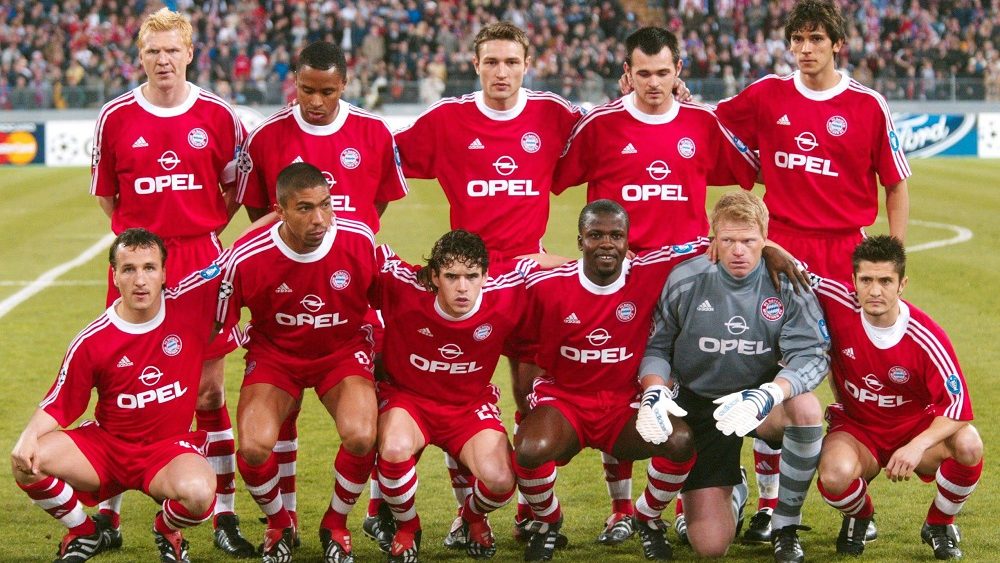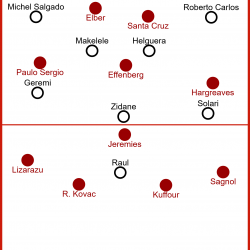Game of my Life #08: The final act for “Effe” and Co.
Bayern was going through a slump after a lofty three year high with three Bundesliga championships in a row and the Champions League Triumph in 2001. They were third in the league at the beginning of April, seven points behind leaders Leverkusen. They had already been kicked out of the DFB-Pokal by Schalke, and they had been struggling in the Champions League as well. Yet despite a couple of patchy performances against Prague, Nantes, and Rotterdam, they survived both group stages relatively comfortably and had qualified for the quarter-finals.
What the game meant
FC Bayern against Real Madrid. This was probably the most emblematic duel of elite European football at around the turn of the century. Both teams had met no fewer than six times only in the period from 1999 to 2001. FC Bayern were victorious in five of these matches, among them a legendary 2-4 away win at the Bernabeu in the spring of 2000 that turned Bayern into something of Real’s bogey team of the time (“la bestia negra”).
Real, who had won the Champions League two times in 1998 and 2000, made one landmark transfer after another during this period. In 2000, they signed Luis Figo for €60m from Barcelona. In 2001, they signed Zinedine Zidane for €77m from Turin. Ronaldo (the original one) and David Beckham followed in the years after. So even though Bayern were the title holders, they were the outsiders for the game just like so often before.
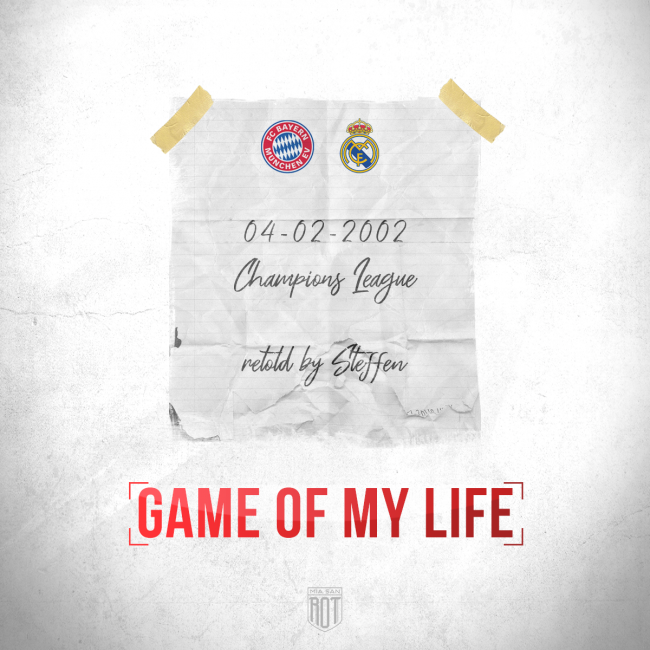
In case you missed it
The starting lineups
Figo was ruled out with an injury, so the team’s backbone consisted of Roberto Carlos at left-back, Zinedine Zidane in the center of midfield, and Raul in attack in a slightly asymmetrical 4-2-3-1 formation. The always underrated Claude Makélélé as the pivot provided stability in defensive midfield.
Bayern’s first eleven was still full of players from the 2001 title winning squad. Of the new arrivals, only Robert Kovač made the first team. Ottmar Hitzfeld had finally made the switch to a straight back four before the season. For years, Lothar Matthäus had played in a sweeper role positioned slightly behind or in front of of his defensive line. Patrik Andersson had followed him in a similar role as part of a back three. After he had left the club in the summer of 2001, a straight line of four at the back became more common with Frenchmen Sagnol and Lizarazu in the wide positions. Effenberg and Jeremies played in the center of midfield and Santa Cruz was given a start in attack next to Giovane Elber. Paulo Sergio added to the front line’s firepower with frequent attacking runs on the left wing. Owen Hargreaves was tasked with disrupting Zidane’s and Roberto Carlos’s efforts on the right side of the pitch and supporting Bayern’s build-up game. Hasan Salihamidžić had to make do with a place on the bench due to a muscular injury alongside regular goal scorer Pizarro. With Fink, Linke and Niko Kovač, the set of substitutes had a decidedly defensive character.
The first half
In the game’s early stages, both teams’ respect for each other was clearly evident. Zidane in particular always drew a great deal of attention to himself whenever he touched the ball. Bayern’s players obviously put great emphasis on blocking his forward moves and switches of the play. Going forward, Bayern acted with extreme caution and tried to hit long balls in the general direction of Fernando Hierro, who had already had problems with the very nimble Giovane Elber in earlier games. Bayern’s efforts, however, remained fruitless at first.
Geremi put the visitors in front in the 11th minute. The Cameroonian pushed inside from a half-right position and beat Oliver Kahn with a seemingly harmless shot from distance into the short corner. The ball bounced up awkwardly directly in front of Kahn, but it was undoubtedly a savable shot.
If the spectators hoped that going behind would serve as a wake-up call to Bayern, their hopes were disappointed. If anything, their game became even more static and uninspired against a Real that now played with great discipline in a deeper position. Stefan Effenberg had been completely invisible up to this point, while Willy Sagnol had a very difficult time against Solari and Roberto Carlos on the right and had to be saved by Kuffour and Kovac on several occasions.
Bayern’s only real chance of the game resulted from a hopeful long ball by Jens Jeremies into the penalty area, which Elber managed to bring on goal with a scissors kick that Cesar Sanchez was able to save (37th minute).
The second half
The picture did not change much in the early stages of the second half. Safe in the knowledge of their 1-0 lead, Real elected to sit back even deeper than before half-time and waited to hit Bayern on the break. The first chance of the second half fell to Raul, who got away from Kuffour behind his back, but could not convert a cross from Makélélé from a tight angle (49th minute).
Giovane Elber, meanwhile, did his best to conquer Real’s defensive stronghold single-handedly. In the 53rd minute, he received a ball from Jeremies, took on three defenders at once and got off a shot at Real’s goal, which Cesar again could stop (49th minute).
In the 63rd minute, Ottmar Hitzfeld had seen enough and brought on two new players. Hasan Salihamidžić came on for the poor Sagnol and Pizarro for the ineffective Sergio. As Salihamidžić went on, murmurs of appreciation went through the crowds. The presence of the energetic Bosnian alone seemed to instil hope among the fans.
The substitution paid off immediately. From now on, Bayern simply had more players in front of the ball, which caused a lot more activity in offense. A header against the crossbar by Elber in the 69th minute after a cross by Lizarazu initiated a remarkable final phase of constant Bayern assaults.
The attacks came thick and fast now. In the 72nd minute, Salihamidžić won a penalty kick when he gratefully stumbled over a dangling leg from Pavon. Effenberg stepped up and took the penalty, but missed.
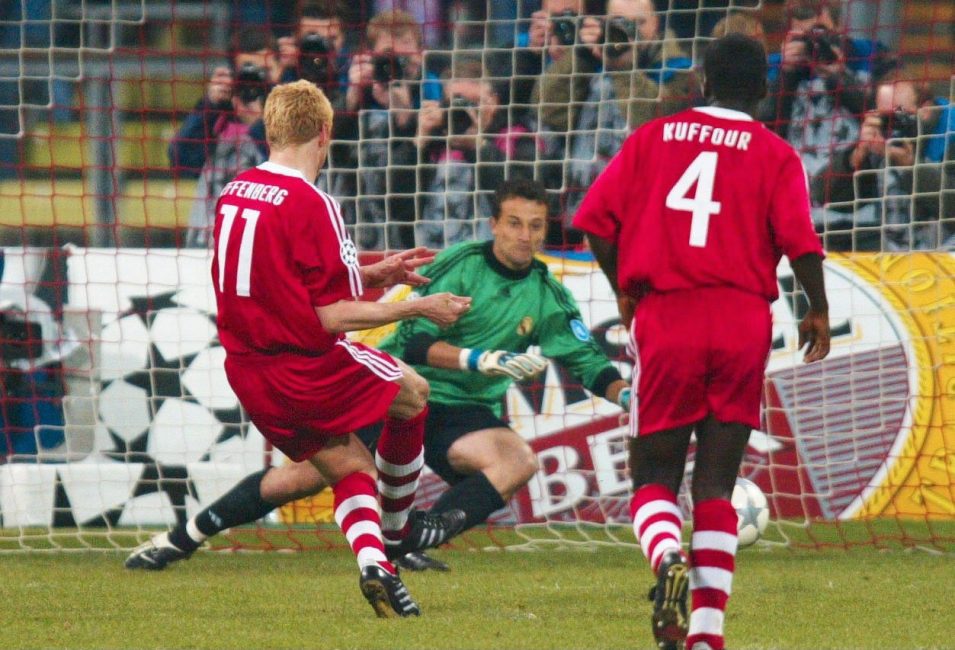
(Image: Alexander Hassenstein/Bongarts/Getty Images)
But Bayern did not let up. Real was increasingly pinned back to their own penalty area. In the 74th minute, Elber missed another outstanding chance from only seven meters after Effenberg had teed him up with a header. Cesar saved the day once more.
Now it was time for Del Bosque to react. He brought on Steve McManaman for Solari, who had been increasingly unable to deal with Salihamidžić. Just as the match seemed to calm down somewhat, Bayern finally found the breakthrough. Salihamidžić controlled the ball at the right corner flag and played a pass back to Santa Cruz. His cross inside was expertly handled by Elber with his back to goal, who managed to put a perfectly timed pass to the advancing Effenberg, which gave him the little bit of space he needed to get off a shot on goal. 1-1. Effenberg. What a twist. Effenberg had been having an awful game so far and had been jeered from the stands just a few minutes earlier when he completely mistimed a long ball. Ottmar Hitzfeld then brought on Niko Kovač for the exhausted Jeremies.
Bayern kept up the pressure. Again, Elber managed to bring a headed ball on goal after a cross from Hargreaves. Again, Cesar was able to parry the ball past the post (85th minute). Bayern was now keen on bringing the ball into the penalty area as quickly as possible. After Kuffour had won a ball in the 88th minute, Salihamidžić hit a long ball over the top straight into the penalty area. Pizarro beat Hierro in an aerial dual and the ball traveled in a high arc towards the penalty spot. There Elber used his body cleverly against Pavon and somehow managed to knock the ball down for Pizarro with a combination of his head and a shoulder while he was stumbling backwards. Pizzaro had continued his run to follow his own header and was able to cooly place the ball into the back of the net from 12 meters out. 2-1. The turnaround!
Apart from a few amusing instances of players huddling up in protest around the referee, nothing else of note happened after that. FC Bayern turned around a seemingly lost game and got an ultimately deserved 2-1 victory.
Things that caught our eye
1. Hitzfeld the tactician
In retrospect, Ottmar Hitzfeld is considered above all for his outstanding people management skills. He always managed to keep his stars happy and motivated over the years. As a coach, Hitzfeld was certainly no tinkerer and tactician with obsessive attention to detail like Trapattoni or later Guardiola, but Hitzfeld had a good feeling for the rhythm of a game and always tried to help his players in the best possible way.
Against Real, for example, he made some important adjustments after his team had conceded the early goal. In order for Effenberg to free himself from the tight cover of Makélélé, Hitzfeld ordered Sergio to play in attack alongside Elber. From that moment on, Santa Cruz could take a more central position, which proved to be an effective decoy to repeatedly draw Makélélé out of position, which enabled Effenberg to frequently drift out to the left and make use of the free space there. This did not greatly affect the game at first, but it was a really good idea.
Even more important was of course the double change in the 63rd minute. In light of Bayern’s reliance on long balls over the top to get the ball upfield, Hitzfeld realized that Elber needed a genuine second striker next to him to put more pressure on Real’s defense.
He brought on the highly dynamic livewire Salihamidzic, which was about the greatest possible contrast to the sometimes phlegmatic Sagnol, who had been made to look like a schoolboy by Solari and was not able to offer any support whatsoever going forward.
Now Hitzfeld’s substitutions were not exactly revolutionary given his side was trailing 0-1, but they were the right thing to do and that is all that matters.
Later in the game, Hitzfeld made a second adjustment. Santa Cruz now played as a tucked-in right winger – probably to allow Salihamidžić more room for his venturous runs down the right flank. Hargreaves now played more centrally and thus adopted Santa Cruz’s task of trying to give Effenberg more space, which the latter used to advance more frequently into the penalty area, as he did for example before scoring the equalizer. Quite a lot of in-game coaching for a supposedly tactically rather “boring” coach.
2. Brazzo’s effect
Salihamidžić was a special player. He was not great at any one single thing, but he could do a lot of things quite well, which earned him a place in Bayern’s first team over a long period of time, often playing in different positions. His duels against Roberto Carlos were legendary even before the game. “Brazzo” often managed to cover the impressive Brazilian so tightly in defense that he could hardly make any impact on his team’s attacking game.
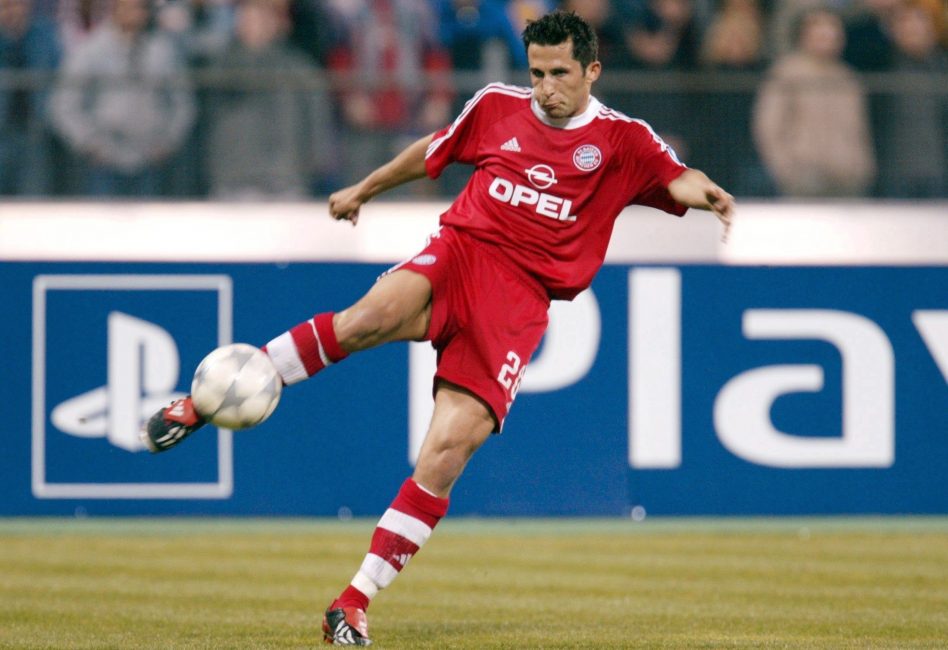
(Image: Peter Schatz/Bongarts/Getty Images)
After Salihamidžić came on, the pace of the game changed. Brazzo always did everything on the pitch at full speed. His energy had an irresistible influence on his teammates, who seemed to suddenly liven up as well as soon as he had entered the pitch. He also immediately positioned himself significantly higher than Sagnol.
When Salihamidžić won the penalty after only nine minutes on the pitch, he had already initiated two promising attacks, fouled and given the previously outstanding Solari a nasty look, argued with Zidane, whipped up the crowd on his side of the pitch to be louder, and shouted at himself after an unfortunate action.
And this was just the beginning. He remained hyperactive throughout the game. He took free kicks, forced del Bosque to bring off Solari, and, as he so often did, held Roberto Carlos back in his own back line. He was also involved in the 2-1 winning goal, when he struck the long ball up front that led to Pizarro’s goal.
Salihamidžić woke the team up and took the game by storm. And he did so as a right-back. Remarkable.
3. Football without dribbles
Looking back at the game from today’s perspective, it is hard to believe how FC Bayern could win a Champions League quarter-final without a single player who consistently tried to take on and get past the opposition in one-on-one challenges. In the game, Paulo Sergio and Roque Santa Cruz were the only ones to have tried this at least once or twice, but with little success.
At the same time, this explains why Mehmet Scholl probably is the most vividly remembered player from this time. When you think of later Bayern teams with players like Arjen Robben, Franck Ribéry or today Serge Gnabry and Kingsley Coman, the style of play Bayern fashioned back then bears hardly any resemblance to what the team plays today. Pass, pass, long ball, pass, straight run with ball at the foot, pass, cross. That is roughly what the game looked like over long periods. It was not attractive, but at the same time it is fascinating to see how the team, despite its obvious limitations, took up the fight with the technically far superior visitors and in the end even found a way to win.
Because even playmaker Effenberg did have an off day, the collective team’s attitude became the key to success. Work rate, fighting spirit, desire, discipline, will, cleverness, physicality. This too can be make for thrilling games, as this generation of Bayern players has proven time and again
4. The underrated Elber
Giovane Elber is not always one of the first names mentioned when talking about the great forwards and players of FC Bayern. Maybe that is because he is missing that one great moment. A decisive goal in a Champions League final or a hat-trick in a big game or a season with 25 or more Bundesliga goals. But even if conversations about the outstanding players of the class of 2001 often begin with Kahn, Effenberg, Lizarazu or even Scholl, Elber has played a huge part in Bayern’s successes during this phase.
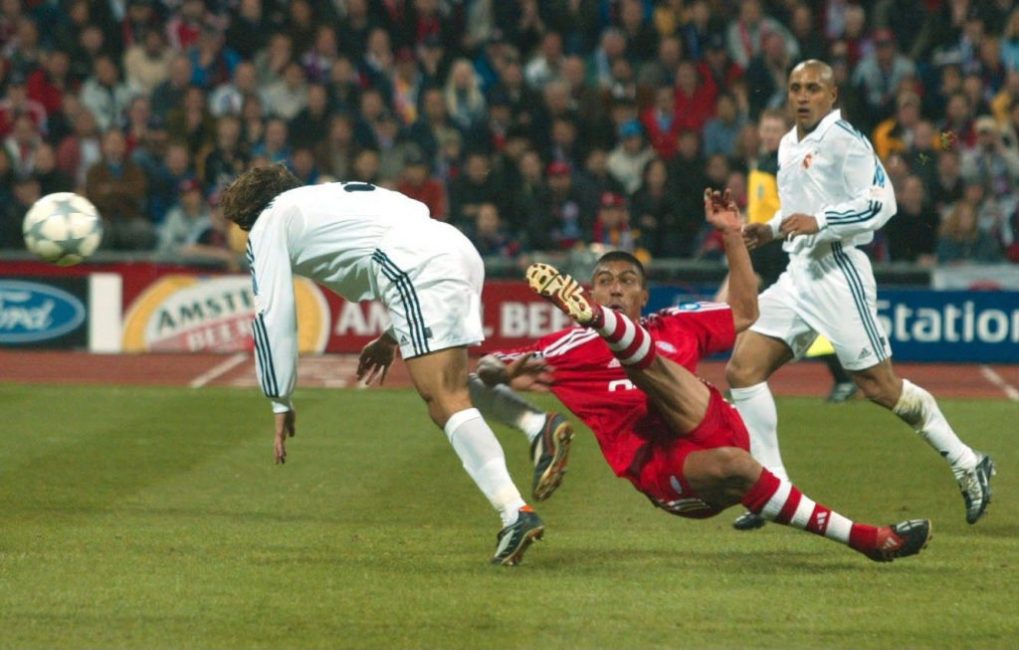
(Image: Alexander Hassenstein/Bongarts/Getty Images)
Elber showed what a versatile striker he was in the game against Real. For more than 70 minutes, he was a painful thorn in the side of Real’s defense and kept them busy virtually all by himself. Even when Bayern was utterly ineffective in attack during the first large chunk of the game, Elber somehow managed to create two or three good chances for himself. And when Bayern gradually got the upper hand later, he was involved in almost every single offensive action of his team. How he managed to control the ball with his back to goal against two defenders before his assist for the equalizer was world class. Then the perfectly timed lay off for Effenberg in the penalty area. All icing, no cake. Equally remarkable was his action before the second goal when he used his body perfectly and cushioned the ball on to Pizarro for the winning goal.
When he was at his best, Elber was one of the most complete forwards Bayern has ever had. Fast. Mobile. Creative. Skillful header of the ball. Good finish. Always available for a pass. Sufficiently fast. Elber would be an immediate fit for the Bayern team of 2020. If you want to understand what kind of footballer Giovane Elber was, you should watch this game. It was one of his best. Even without having scored a goal.
5. What the game meant for the club
When I attended the game as a 16-year-old, I had no idea that I was about to witness what probably was the last great moment of the second important FC Bayern era of my life. It was the last Champions League home game of Stefan Effenberg. He left the club for Wolfsburg after the end of the season. It was the last big Champions League moment for Bayern for what felt like an eternity. Perhaps until Roy Makaay’s 10-second goal against Real Madrid in March 2007. The period from 1999 to 2001 was a bit like the period from 2010 to 2016. It was out of the question that FC Bayern would not be one of the main contenders for the Champions League title every year. Until it was not. The attempt of Bayern to usher in a new era with the signings of Sebastian Deisler and Michael Ballack in the following summer remained unsuccessful, at least as far as European football is concerned.
The fact that only a few months after the match against Real Madrid, two young men from the Bayern reserves made their debut in the first team did not change anything. Philipp Lahm and Bastian Schweinsteiger. Their time would come a little later.
The 2-1 victory against an apparently all-powerful Real was a reminder of what this golden era at Bayern was all about. The players on the pitch fitted together as a team, and as a collective they were able to achieve victories. Spectacular victories. Even though it was not necessarily spectacular football.
As a Bayern fan, you had to love this team. The hard workers like Jeremies, Brazzo or Kuffour. The elegant ball handlers like Santa Cruz or Lizarazu. The cheeky jesters like Elber or Scholl. Or the strong personalities like Effenberg or Kahn, who as leaders radiated as much class and authority even on bad days as only very few in the history of Bayern or German football in general have ever done. Even if some of them would still be at the club for many more years to come: In a way, their common tale ended with this game.
Real Madrid won the second leg in a hard-fought match 2-0, a deserved victory that saw them reach the semi-finals. In the end, the men around Zinedine Zidane won the Champions League title against Bayer Leverkusen. But their big dreams were not to come to fruition in the following years. “The Galactics” failed to define an era during the years that followed. It was for a certain Cristiano Ronaldo to achieve this a decade later.
Even if ultimately there was no great happy ending for FC Bayern to this story, this game has been firmly lodged in my memory as a very special one.

